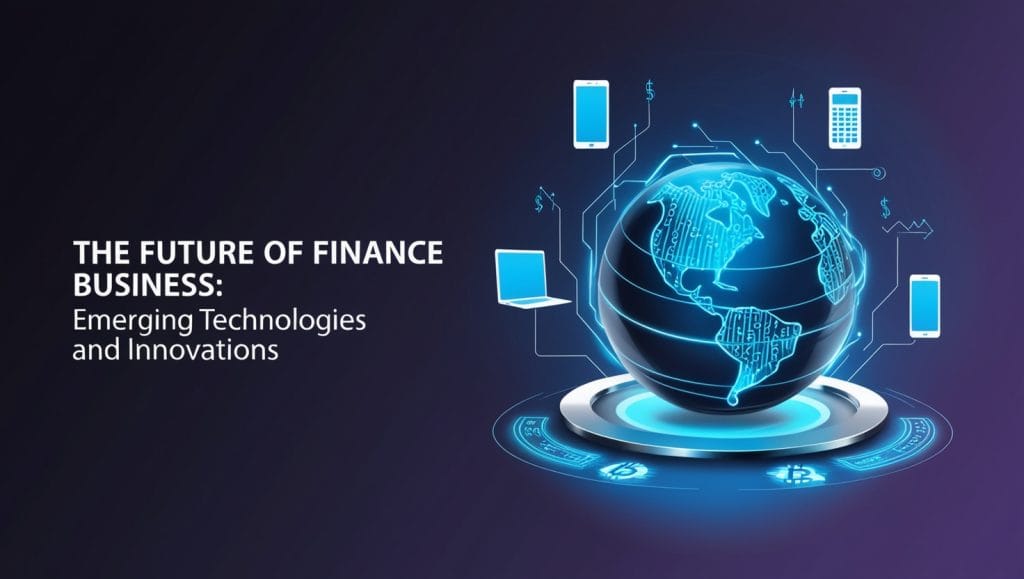The Future of Finance Business: Emerging Technologies and Innovations in 2024

The Future of Finance Business: Emerging Technologies and Innovations-The finance business is undergoing a transformation unlike anything we’ve seen before. Rapid advancements in technology are reshaping how financial institutions operate, how businesses engage with their clients, and how consumers manage their finances. In the coming years, the landscape of the finance industry will continue to be influenced by emerging technologies and innovations. This article explores the key trends and technologies that are set to define the future of the finance business.
1. The Rise of Artificial Intelligence (AI) in Finance
Artificial intelligence (AI) has already made a significant impact on the finance business, and its role will only expand in the future. AI is revolutionizing how financial institutions process data, make decisions, and interact with customers. Machine learning algorithms, which can analyze vast amounts of data and identify patterns, are becoming increasingly integral in areas like investment strategies, risk management, and customer service.
In the future, we can expect AI to play an even larger role in automating tasks, providing personalized financial advice, and improving fraud detection. AI-driven robo-advisors are already helping individuals make smarter investment decisions at a lower cost, and as the technology advances, these systems will become even more sophisticated, offering hyper-personalized solutions. For financial firms, AI presents an opportunity to enhance operational efficiency, reduce costs, and improve customer experiences—making it a central component of future finance business strategies.
2. Blockchain and Decentralized Finance (DeFi)

Blockchain technology is one of the most groundbreaking innovations in recent years, and it is poised to transform the finance business in profound ways. At its core, blockchain provides a decentralized, secure way to record transactions across a network of computers, reducing the need for intermediaries and enabling faster, cheaper transactions.
While cryptocurrencies like Bitcoin and Ethereum are perhaps the most well-known applications of blockchain, the technology’s impact goes beyond digital currencies. Blockchain is enabling the rise of decentralized finance (DeFi), a movement that aims to provide traditional financial services—such as lending, borrowing, and trading—without the need for banks or other financial intermediaries. DeFi platforms leverage smart contracts, which are self-executing agreements coded onto the blockchain, to automate and facilitate financial transactions in a transparent and secure manner.
In the future, blockchain and DeFi are likely to disrupt traditional banking systems, offering consumers more control over their financial transactions and providing underserved populations with access to financial services. As governments and regulatory bodies begin to create clearer guidelines around cryptocurrencies and blockchain, the technology will continue to evolve and integrate into the mainstream finance business.
3. The Growth of Digital Banking and Neobanks
Digital banking has gained significant traction in recent years, and its growth shows no signs of slowing down. Neobanks—entirely digital banks that operate without physical branches—are a prime example of how the finance business is evolving. These banks offer a range of financial services, including savings accounts, loans, and payment solutions, all through user-friendly mobile apps and online platforms.
In the future, neobanks are expected to become even more popular, especially among younger generations who prioritize convenience, low fees, and seamless digital experiences. By eliminating overhead costs associated with physical branches, neobanks can offer more competitive rates and cater to the needs of tech-savvy customers. Additionally, digital banks are increasingly offering personalized financial advice through AI-powered chatbots and virtual assistants, further enhancing the customer experience.
As digital banking continues to grow, traditional banks will need to adapt by incorporating more digital features into their offerings. The future of finance business will likely see a hybrid model, where established banks embrace digital-first strategies while neobanks continue to expand their services and customer bases. (Read More: Exploring the Most In-Demand Business Degree Jobs in the Finance Sector in 2024)
4. Fintech Innovations and Payment Solutions
Financial technology (fintech) has already disrupted traditional financial services, and in the future, fintech companies will continue to lead the charge in developing innovative solutions for payments, lending, insurance, and wealth management. Mobile payment systems like Apple Pay, Google Pay, and Venmo have already changed how we make payments, and more innovations are on the horizon.
The future of payments is likely to be even more seamless, with technologies such as contactless payments, biometric authentication, and blockchain-enabled payment systems taking center stage. Consumers are increasingly looking for faster, more secure ways to make transactions, and fintech companies are stepping up to meet that demand. Cross-border payments, for example, are expected to become more efficient with the integration of blockchain, allowing for faster and cheaper international transfers.
In addition to payment solutions, fintech innovations are also transforming lending and insurance. Peer-to-peer lending platforms and insurtech startups are disrupting traditional lending models and making it easier for individuals and businesses to access credit. The future of finance business will likely see more partnerships between fintech companies and traditional financial institutions as they work together to create more innovative products and services. (Read More: Finance Buzz: Navigating the 2024 Stock Market Trends with Confidence)
5. The Integration of Big Data and Advanced Analytics
Big data and advanced analytics are already playing a pivotal role in the finance business, helping firms make more informed decisions and gain insights into customer behavior, market trends, and potential risks. As data continues to grow in volume and complexity, the ability to harness and analyze this data will become even more crucial for financial institutions.
In the future, the finance business will rely heavily on big data analytics to drive everything from investment strategies to credit scoring and risk management. AI-powered tools will allow firms to sift through vast datasets and make predictions about market movements, customer preferences, and financial outcomes. For example, predictive analytics can help investors identify the best-performing assets or predict economic downturns, while advanced risk models can help banks better assess creditworthiness and minimize loan defaults.
The integration of big data and analytics will also lead to more personalized financial products. By analyzing individual financial behaviors and preferences, finance businesses will be able to offer tailored solutions, whether it’s a customized savings plan, a targeted loan offer, or a personalized investment portfolio. (Read More: Emerging Trends in Finance and Accounting Automation for 2024)
6. The Role of Cybersecurity in the Future of Finance

As digital technologies become more embedded in the finance business, cybersecurity will be a top priority. Financial institutions are prime targets for cybercriminals, and the rise of AI, blockchain, and digital payments brings new security challenges.
In the future, finance businesses will invest heavily in advanced cybersecurity measures to protect sensitive data and ensure the integrity of transactions. AI and machine learning will play a significant role in detecting and preventing cyber threats in real time. Additionally, the adoption of blockchain technology can help improve security by providing a decentralized and tamper-proof ledger of transactions.
Consumers will also expect more robust security features, including biometric authentication, multi-factor authentication, and end-to-end encryption. As the finance business becomes increasingly digital, maintaining strong cybersecurity will be critical to preserving customer trust and preventing data breaches.
Conclusion article The Future of Finance Business: Emerging Technologies and Innovations
The future of the finance business is exciting, driven by emerging technologies that promise to reshape the industry. AI, blockchain, fintech innovations, digital banking, and big data analytics are all set to revolutionize how financial services are delivered and consumed. For financial institutions, embracing these technologies is not just an opportunity—it’s essential for staying competitive in an increasingly digital and customer-centric world. As these technologies continue to evolve, the finance business will become more efficient, secure, and accessible, offering a wealth of new possibilities for both businesses and consumers alike.





